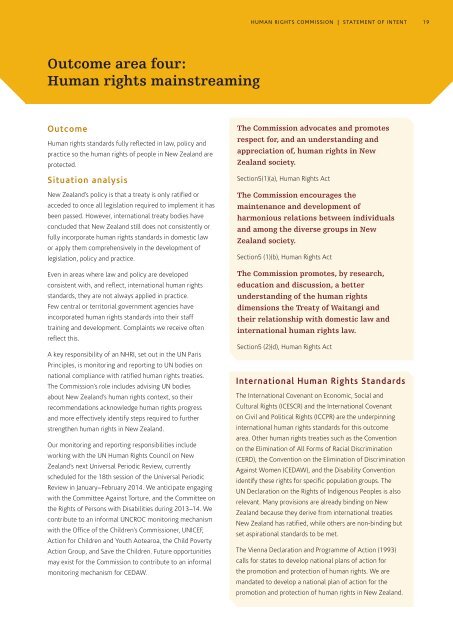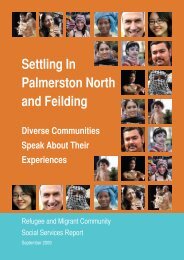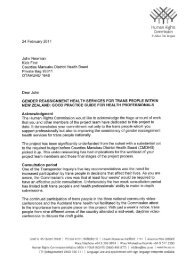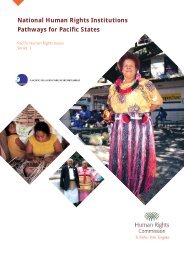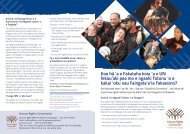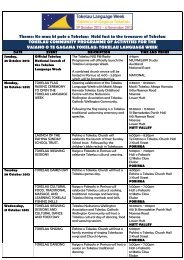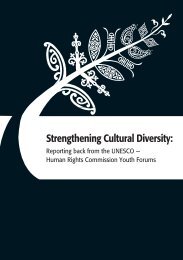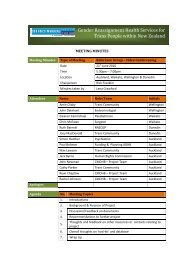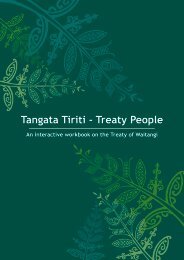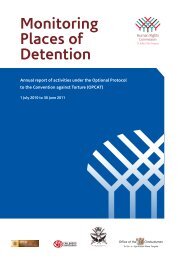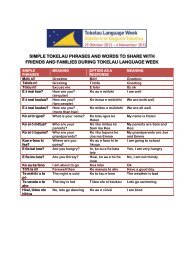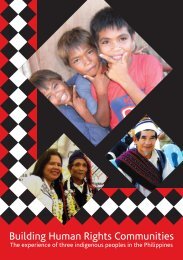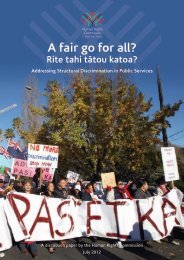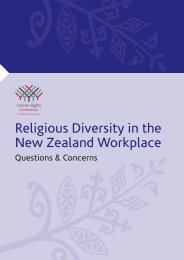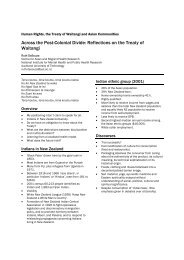Statement of Intent 2013 to 2016 - Human Rights Commission
Statement of Intent 2013 to 2016 - Human Rights Commission
Statement of Intent 2013 to 2016 - Human Rights Commission
You also want an ePaper? Increase the reach of your titles
YUMPU automatically turns print PDFs into web optimized ePapers that Google loves.
HUMAN RIGHTS COMMISSION | STATEMENT OF INTENT19Outcome area four:<strong>Human</strong> rights mainstreamingOutcome<strong>Human</strong> rights standards fully reflected in law, policy andpractice so the human rights <strong>of</strong> people in New Zealand areprotected.Situation analysisNew Zealand’s policy is that a treaty is only ratified oracceded <strong>to</strong> once all legislation required <strong>to</strong> implement it hasbeen passed. However, international treaty bodies haveconcluded that New Zealand still does not consistently orfully incorporate human rights standards in domestic lawor apply them comprehensively in the development <strong>of</strong>legislation, policy and practice.Even in areas where law and policy are developedconsistent with, and reflect, international human rightsstandards, they are not always applied in practice.Few central or terri<strong>to</strong>rial government agencies haveincorporated human rights standards in<strong>to</strong> their stafftraining and development. Complaints we receive <strong>of</strong>tenreflect this.A key responsibility <strong>of</strong> an NHRI, set out in the UN ParisPrinciples, is moni<strong>to</strong>ring and reporting <strong>to</strong> UN bodies onnational compliance with ratified human rights treaties.The <strong>Commission</strong>’s role includes advising UN bodiesabout New Zealand’s human rights context, so theirrecommendations acknowledge human rights progressand more effectively identify steps required <strong>to</strong> furtherstrengthen human rights in New Zealand.Our moni<strong>to</strong>ring and reporting responsibilities includeworking with the UN <strong>Human</strong> <strong>Rights</strong> Council on NewZealand’s next Universal Periodic Review, currentlyscheduled for the 18th session <strong>of</strong> the Universal PeriodicReview in January−February 2014. We anticipate engagingwith the Committee Against Torture, and the Committee onthe <strong>Rights</strong> <strong>of</strong> Persons with Disabilities during <strong>2013</strong>−14. Wecontribute <strong>to</strong> an informal UNCROC moni<strong>to</strong>ring mechanismwith the Office <strong>of</strong> the Children’s <strong>Commission</strong>er, UNICEF,Action for Children and Youth Aotearoa, the Child PovertyAction Group, and Save the Children. Future opportunitiesmay exist for the <strong>Commission</strong> <strong>to</strong> contribute <strong>to</strong> an informalmoni<strong>to</strong>ring mechanism for CEDAW.The <strong>Commission</strong> advocates and promotesrespect for, and an understanding andappreciation <strong>of</strong>, human rights in NewZealand society.Section5(1)(a), <strong>Human</strong> <strong>Rights</strong> ActThe <strong>Commission</strong> encourages themaintenance and development <strong>of</strong>harmonious relations between individualsand among the diverse groups in NewZealand society.Section5 (1)(b), <strong>Human</strong> <strong>Rights</strong> ActThe <strong>Commission</strong> promotes, by research,education and discussion, a betterunderstanding <strong>of</strong> the human rightsdimensions the Treaty <strong>of</strong> Waitangi andtheir relationship with domestic law andinternational human rights law.Section5 (2)(d), <strong>Human</strong> <strong>Rights</strong> ActInternational <strong>Human</strong> <strong>Rights</strong> StandardsThe International Covenant on Economic, Social andCultural <strong>Rights</strong> (ICESCR) and the International Covenan<strong>to</strong>n Civil and Political <strong>Rights</strong> (ICCPR) are the underpinninginternational human rights standards for this outcomearea. Other human rights treaties such as the Conventionon the Elimination <strong>of</strong> All Forms <strong>of</strong> Racial Discrimination(CERD), the Convention on the Elimination <strong>of</strong> DiscriminationAgainst Women (CEDAW), and the Disability Conventionidentify these rights for specific population groups. TheUN Declaration on the <strong>Rights</strong> <strong>of</strong> Indigenous Peoples is alsorelevant. Many provisions are already binding on NewZealand because they derive from international treatiesNew Zealand has ratified, while others are non-binding butset aspirational standards <strong>to</strong> be met.The Vienna Declaration and Programme <strong>of</strong> Action (1993)calls for states <strong>to</strong> develop national plans <strong>of</strong> action forthe promotion and protection <strong>of</strong> human rights. We aremandated <strong>to</strong> develop a national plan <strong>of</strong> action for thepromotion and protection <strong>of</strong> human rights in New Zealand.


